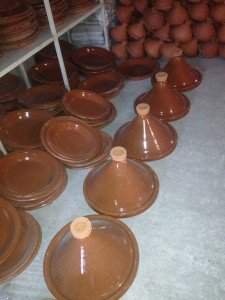There’s great potential in the Moroccan craft industry for Hungarians

The Moroccan craft industry provides great opportunities for Hungarian companies to sell and manufacture handcraft, pottery, and ceramic products, and also to export the necessary materials. The craft industry goes back to centuries in Morocco, and the products are not only beautiful and practical, but also unique, globoport.hu writes.
Dr József Steier, leader of the HTCC (Hungarian Trade and Cultural Center) in Morocco, was invited to be a guest lecturer by the University of Caen Normandy in France, for a course titled “The future of biocomposites,” which was organized by experts and students from the Maghreb countries.
The participants visited the outskirts of Marrakesh, where all the workshops and manufactures use pottery to make  different products. The group was led by Mohamed Wagif from the Cadi Ayyad University, and introduced the local manufacturing techniques and the current state of the industry.
different products. The group was led by Mohamed Wagif from the Cadi Ayyad University, and introduced the local manufacturing techniques and the current state of the industry.
Only a couple of thousand people are living in the district, and all of them do pottery for a living. Most manufactures are small, with only 15-20 employees, and make about 100 products a day, ranging in variety from wall décor to pots. One of the most famous products of the Moroccan craft industry, the tajine pots are also made there.
Dr József Steier told globport.hu that they were presented almost 2000 samples in one of the workshops, and Hungarians could learn a thing or two from Moroccan manufacturers: 90% of their products are ordered from abroad. The manufactures can mass product certain products, but also take requests.
Dr Steier added that Moroccan clay has a poor quality, and manufactures are forced to order materials from Portugal, Turkey, and Spain, and 90% of their gas supply comes from abroad, because there’s not enough wood to make fire and dry the clay. The prices are still competitive, however, mainly because of the low labour cost. The minimum wage is 2500 Moroccan dirham that equals to €250. People work 10-12 hours a day, but they barely have any other choices, as the country is short on jobs and the unemployment rate is high.
Hungarian companies would have plenty of opportunities in Morocco, especially those in the construction industry, and many should pay a visit to the country, Steier emphasized. The number of buildings has grown significantly in Hungary in the past couple of years, and Berber and Moroccan motifs could enrich some local buildings which have dull walls.
The HTCC in Marrakesh gives Hungarian companies every help if they decide to take their business to Morocco, and would also help them find potential partners.
Photo: globoport.hu
Copy editor: bm
Source: globoport.hu







